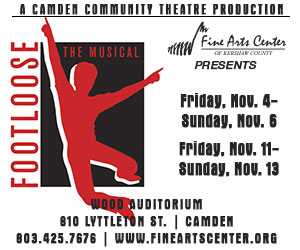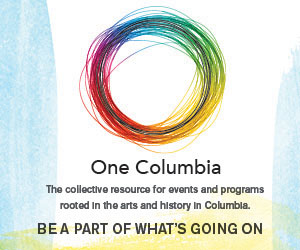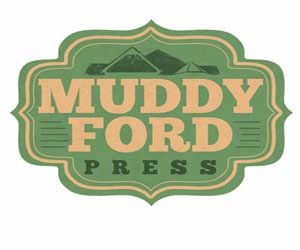Josh Roberts and Pulling the Hinges Off Rock and Roll
“[The term] ‘Southern rock’ is a bit redundant; it’s like saying ‘rock rock.’” – Duane Allman
Halfway through our winding conversation, singer/songwriter/guitarist Josh Roberts unconsciously paraphrases the legendary slide guitarist Duane Allman in concluding that “all rock is Southern.” We are sitting in a (temporarily) sweltering thrift shop in Lexington that’s owned and run by his wife and bandmate, Leslie Branham.
It’s a fitting moment for a couple of reasons, not the least of which is that the skinny, bearded, and long-haired Roberts often can come across as a modern-day Duane Allman himself. Like Allman, Roberts is humble and friendly off-stage, but on-stage he leads a taut live band capable of improvisational flights of fancy and roots-oriented rock songs that sample liberally from country, blues, and gospel traditions. Of course his band, Josh Roberts and the Hinges, also specializes in Neil Young-style guitar epics and Pink Floyd-esque psychedelic romps. And Allman’s fluid slide guitar lines owe a bit more directly to the blues than do Roberts’, so it isn’t a one-for-one comparison. Nonetheless, the two share an adventurous musical spirit and an awe-inspiring sense of transcendence when they lead their fellow musicians mid-song into uncharted territory.
As it turns out, both also share an ambivalence towards the term “Southern rock.” Both guitar players’ feelings stem more from the musical baggage of the term than any sort of rejection of regional identity. “Yeah we are from the South and we rock,” Roberts says, “and in itself, that phrase works, but not with the meaning it’s been given now. I’m not going on about ‘my neck has always been red and my collar’s still blue’ or anything. But I love Lynyrd Skynyrd, The Allman Brothers Band, people like that.”
Still, when people ask what sort of music he plays exactly, Roberts typically resorts to the simple answer: “I usually say rock and roll. And then they say, ‘well what kind exactly,’” he laughs. “So I just say ‘rock and roll with the roots showing.’ I figure if you say that and you live by that credo, you aren’t afraid of any of the roots of the music or anything. And we’re not afraid of country music; we’re not afraid of blues music. So that’s about right, really.”
All of this probably comes as no surprise to Roberts’ growing fan base, which is well-versed in his familiarity with the pantheon of rock and roll legends, both through his guitar-playing and his impassioned covers, but his musical beginnings are a bit surprising for somebody who has become a local guitar god. “I was a singer first,” he explains. “I grew up singing in school plays and church choirs. I didn’t start playing the guitar until I was 15 or 16 years old.”
It was right around that time that Roberts first met Ryan Monroe, the gifted singer and keyboard player who formed Captain Easy with Roberts after high school and who would tour with him throughout the Southeast for about five years. They met, believe it or not, when both were performing in a production of Grease at the newly opened Dutch Fork High School. “I was Danny Zuko, and he was Kenickie,” Roberts remembers with a smile. “That’s really where I learned how to be in a band – it was like going to college.”
Captain Easy featured songs by both Monroe and Roberts and had a jam-friendly, anything-goes sort of vibe that made it a popular live act, particularly when Roberts’ already substantial guitar skills were put in the mix with Monroe’s active keyboard parts and ear for clever, elaborate arrangements.
When Captain Easy split up after a New Years Eve show in 2004 (Ryan Monroe would go on to join the acclaimed Band of Horses and tour around the world), Roberts began playing a few dates as lead guitarist for Danielle Howle and started forming a new band. The first member of the Hinges was rhythm guitarist, Robert Walker, whose band Man at Arms broke up the same day as Captain Easy and who had previously worked at a local deli with Roberts. From there, the band went through a series of changes before settling into their current line-up, which coalesced not long after the group put out its debut record, 2005’s The Sugarbird Test. Leslie Branham was brought in to play guitar and banjo and sing back-up vocals (before the two became romantically involved) and, after original bassist Jim Taylor left, Corey Stephens from Milledgeville, Georgia, joined the band.
“I just called him up after Jim had to leave,” Roberts recalls. “We knew each other from when Captain Easy use to play Milledgeville – he had sat in with us on bass before. At the time, I lived in a farmhouse out in Irmo, which was great because we were set out far enough away from anybody that we could play all night.” When Stephens came up to practice for the first time, “We just played and played and played, and it worked immediately,” he recounts fondly. “He’s been driving three hours every time to play with us ever since.”
Burns Out Bright drummer Chris Shirah joined the Hinges right around the same time as Stephens and helped the band make My War Cry Is Amor (2007) – which still stands as their crowning musical statement on record – but he ended up leaving to pursue other projects. The band eventually settled on Dennis Ware, who had played in The Mountain Express and King Hippo and also had a bizarre connection to Roberts. “He was actually the first drummer I ever played with, back when I was trying to be just a singer,” Roberts says. “[It was so long ago] that we didn’t even recognize each other until later.”
Between the two accomplished, full-length albums and a tour schedule that quickly came to match Captain Easy’s, Josh Roberts and the Hinges quickly joined the top echelon of regional bands, opening for Robert Randolph, Drive-By Truckers, and Band of Horses, among others. A solo EP of more singer/songwriter-oriented material followed, and the band has spent the past few years hard at work on a follow-up.
Roberts speaks of his band’s musical success with obvious pride. “We have a great rapport,” he says. “Every fifth song or so [live], we’ll dive off a cliff and see where it takes us.” These moments, where band members drift away from the song structure and feel each other out for where they are going next, are some of the most chill-inducing moments you will find in live music.
The power of the band’s live show is so great that it convinced sound engineer and producer Alan Moon to join the Hinges team as producer and band promoter. He inspires super fans like Joel Hudson to tape many of the band’s shows and upload them to the Live Music Archive, an online database primarily geared towards jam band tape culture.
To Roberts and company though, it’s business as usual. “It’s all about listening to each other and taking a chance when it comes to you,” he explains. “As long as you are listening to each other, taking a chance is easy to do once you decide to do it.” The other metaphor he uses is “just riding. You can’t plan ahead, because that’s when you get in trouble. You just got to follow the road and watch for the turns.”
It’s not just instrumental prowess that makes Roberts great – he is also a top-notch songwriter and singer who can get by just as often with nothing but an acoustic guitar and his voice. He’ll be the first to admit that his musical heroes are “all those guys from the ‘60s and ‘70s − Dylan, Neil Young, Led Zeppelin – that’s what I wanted to be like [when I was growing up].” But Roberts also has a surprising interest in pre-war musical forms in both blues and folk traditions. “In high school, I went through a huge phase where I listened to nothing but blues, … especially the Delta blues, Robert Johnson, Son House, but also the electric stuff. Howlin’ Wolf and John Lee Hooker, in particular,” Robert reminisces. He also talks a lot about discovering the Harry Smith anthology of pre-war folk music, which had a formative impact on his songwriting right around the writing and recording of My War Cry Is Amor.
“I loved how they just sang syllables – so a lot of them ended up on the album,” he says. “I also write lyrics phonetically sometimes. I know Kurt Cobain did that, and all those death metal guys do it. I like trying to fit good images or meanings into something you’ve already mumbled or yelled in the first place. It’s a good challenge.”
Roberts also talks about taking lines from television shows or films as a basis for writing songs but demurs when assigning specific meanings or stories to individual songs. “Things develop new meanings over time,” he says. “And even at my most directly autobiographical, it’s only about 30-50 percent.”
As a vocalist, Roberts has one of those voices that critics like to call “whiskey soaked.” It’s a weathered, expressive instrument that lingers in one’s mind, somehow conveying a sense of gravity or wisdom even when he is “just muttering syllables.” Of course, he has always had the support of some wonderful harmony singers as well.
“I can’t take any credit for that,” he readily admits. “I can say ‘how about some harmonies here,’ but I can’t sing them. It’s the biggest hole in my [musicianship]. Ryan Monroe, Leslie [Branham], Corey [Stephens] — they sing anything, all sorts of notes and parts. I’m just blessed to have always worked with such great singers.”
Roberts says he can train himself to sing simple harmonies though, and, despite his difficulties, he has some other impressive talents to make up for it. “I can play lead and sing at the same time, no problem,” he says, crediting muscle memory and a strategy of “not thinking about either of them” as he does it. He’s also been stretching himself in the studio for the new record, employing some Jimmy Page-style guitar harmonies in lieu of traditional guitar chords.
“Literally nine guitars are playing the chords, with no rhythm guitar,” he explains excitedly. “It sounds really cool, kind of like an electric piano.” This attention to detail speaks to Roberts’ different approach in the studio this time around. “Recording is a different art form entirely, at least it feels like that to me,” he admits. “With the Hinges, it’s always been ‘let’s go in and rock it out,’ and then it’s mostly done, with a minimum of overdubs. This time has been much different.”
Roberts is looking to release his new, as yet untitled record sometime early next year. In the meantime, expect him to be on stage, in front of crowds all across the Southeast, keeping the rock and roll spirit of possibility and wonder alive. Thank God.
— Kyle Petersen






.jpg)
